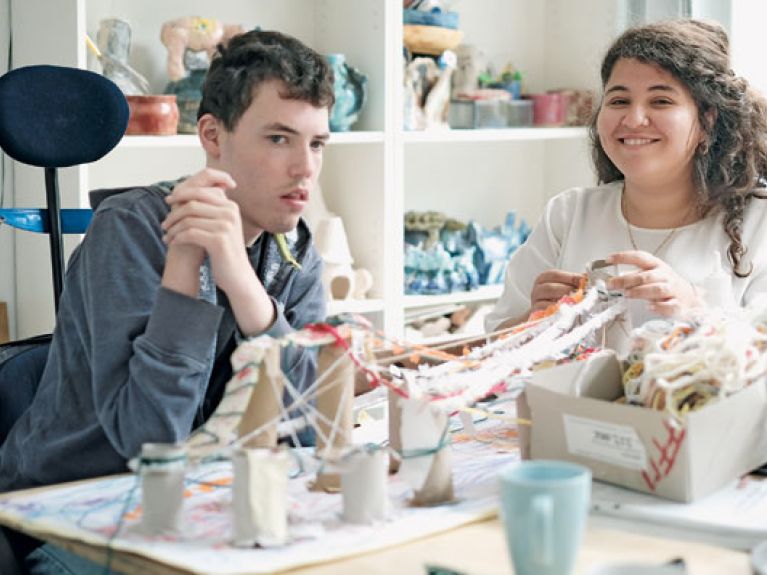Ambassadors of diversity
The new German-Israeli Volunteer Service aims to strengthen partnership between the two countries.

When spring arrived Orel noticed a change in Germans’ behaviour. Suddenly they smiled more, engaged in chance conversations with one another, were out on the streets more. Frankfurt became louder and livelier. Orel was fascinated, not being familiar with such mood changes from Israel: it’s astonishing how the weather can influence people’s love of life.
Orel came to Germany seven months ago with the new German-Israeli Volunteer Service (DIFD) to work for a social and a Jewish organisation in Frankfurt. She is participating in the first year of the programme, which was launched in May 2015 to mark the 50th anniversary of diplomatic relations between Israel and Germany. With this initiative the Federal Government aims to encourage above all young people from Israel to live in Germany for a time. There were ten participants in the first year. They worked for six months or a year in placements at charitable institutions in Germany arranged by the Central Board of Jewish Welfare in Germany (ZWST) on behalf of the Federal Ministry of Family Affairs, Senior Citizens, Women and Youth. “There is a long tradition of German volunteering in Israel,” says Laura Cazés, who coordinates the programme for the ZWST. “Until now we didn’t have a similar structure for volunteers from Israel.”
Diplomatically, the two countries have close relations, and social exchange has also been promoted for some time. But as Federal President Joachim Gauck emphasised in his speech on 12 May 2015 in Berlin at the ceremony marking the 50th anniversary, there is still scope for further involvement. He cited a study by the Bertelsmann Foundation which found that reservations had become cemented in Germany as a result of perceptions of the conflict between Israel and the Palestinian territories. That is the starting point for the volunteer programme, which also sends Germans to Israel: personal and cultural exchange is intended to promote understanding and tolerance – across religious divides. Young people of all faiths from both countries can take part. The ZWST regards them as ambassadors.
What is more, the programme is also in keeping with the zeitgeist: young people from Israel see Germany as cool. The capital in particular, Berlin, considered as the centre for creatives, has developed a magnetic attraction for Israelis in recent years. According to the ZWST, however, cities like Cologne, Leipzig and Frankfurt are now also becoming more popular for short or longer stays. The third generation after the war would like to get to know and understand the country that drove their grandparents out. People like Gaya, for example, who was a social worker at a school during the programme’s three-month pilot phase. Meantime she has returned to Israel. “I wanted to complete a circle by daring to come here,” she says.
Orel opted for volunteer work in Frankfurt because she was curious to know whether the connection with the Germans that is felt in Israel also exists in the opposite direction. And it is. Orel quickly found two language tandem partners for German and Hebrew. Now the 23-year-old is happy to have been placed in Frankfurt, where she lives in a flat share with other young people, and where her country of origin interests people. She does admit however, that she “initially wanted to go to Berlin”. When she is not looking after children in a Jewish institution, Orel works in an art studio for people with disabilities. “Everyone there speaks German. I’m always surprised that I manage to have conversations with them.” Because of the new language, it took some time for her to get used to things. There were also the many cultural peculiarities of the Germans: expected polite phrases, everyday rituals like waste separation and a kind of demonstrative silence in lifts. Today Orel feels at home in Frankfurt: “Because it is tolerant. Everyone can be as they are.”
The ZWST, which has contacts with large German charitable organisations because of its focus on youth and social work, places 18- to 27-year-old volunteers in various organisations, depending on their interests: all-day schools and youth education centre, Jewish communities and social facilities. Many of the participants work with refugees. Thanks to the new challenges, their placement is more relevant, says Cazés, because many of the Israelis are a great help in taking care of refugees due to their knowledge of Arabic.
Yet it is not always easy to find a suitable placement, as this must correspond to the abilities and interests of the participants, and a lot of Germans also want to do a voluntary social year. The Federal Ministry for Family Affairs bears the cost of a 250-euro allowance and social insurance for the DIFD volunteers, while accommodation and meals have to be paid for by the placement organisation. Educational cooperation activities and town twinning arrangements with Israel have allowed the ZWST to create several opportunities, and even more should become available by the time the next year begins in autumn 2016.
Roman belongs to the small group of Germans who have so far been in Israel with the new DIFD. He completed a six-month care placement there in the context of his medical studies. The 19-year-old has been back in Munich since the end of March. At first, things in Jerusalem were not easy for him: “Suddenly you are totally responsible for yourself.” But realising this meant rising to the challenge. People’s mentality, open-mindedness and everyday optimism impressed Roman greatly. In Israel the Ministry of Welfare and Social Affairs is responsible for the volunteers and also selects the participants for the visit to Germany.
In the first year, fewer Israeli volunteers than planned came to Germany, so the ZWST aims to underscore the socio-political relevance of the exchange even more. “Particularly now, when there is a tangible shift to the right among Germans, our volunteer service can achieve a lot,” says Laura Cazés. The participants have succeeded in highlighting the diversity in Israeli society: Druze and Muslim-Arab, secular and traditional Israelis have been involved. In the second year, about 40 participants should be coming to Germany.
Orel hopes that future volunteers have as perfect a stay as the one she had in Frankfurt. ▪
Elena Witzeck
